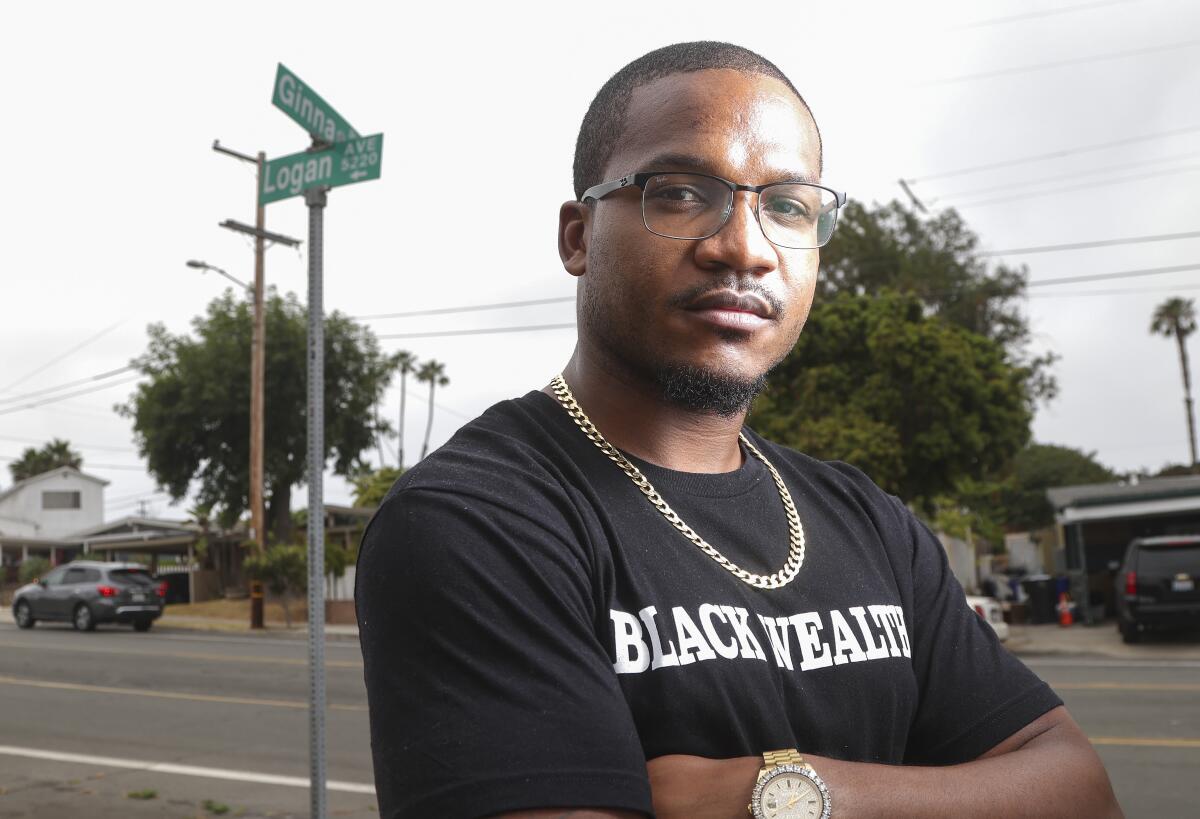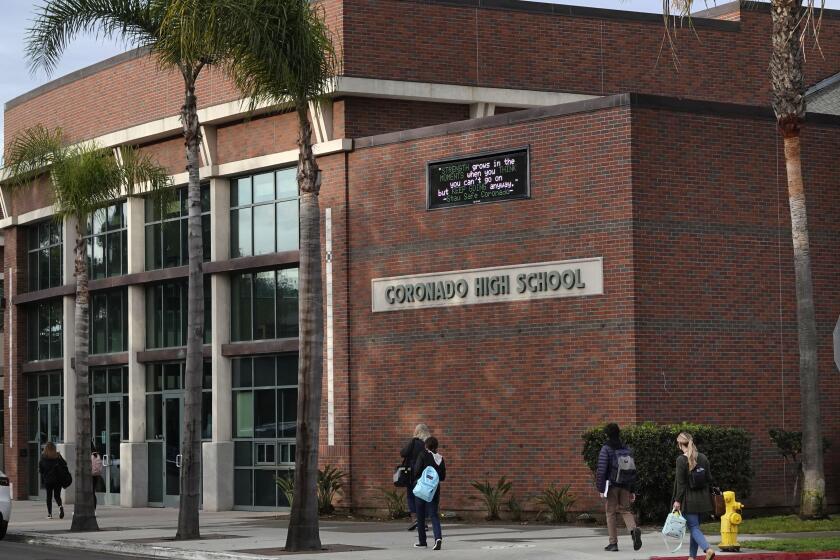He once faced the possibility of life in prison. Now he’s a UC Berkeley graduate

SAN DIEGO — Aaron Harvey first heard of UC Berkeley when he saw a TV promotion for the school as he sat in jail, facing conspiracy charges stemming from nine San Diego gang-related shootings.
He didn’t even know that UC Berkeley and “Cal,” a title he knew through sports, were the same school when he saw the TV spot seven years ago. But the promo seduced the young man, whose freedom and future were in jeopardy.
He maintained he was innocent of the charges, but he was still facing 56 years to life in prison.
“From day one, I was like, ‘I am going to Berkeley,’” Harvey said. “I think I was just telling myself that to give myself something to look forward to when you are sitting in such a dark place.”
First, he had to fight the sweeping gang murder conspiracy case targeting 33 people in two southeastern San Diego neighborhoods, including his native Lincoln Park. The fight would rally the community, make headlines and clap back at prosecutors who used an untested law that critics blasted as nothing more than guilt by association.
After several months of courtroom battles, a judge dropped the charges. Harvey was freed. Now, the 33-year-old has earned a political science degree from UC Berkeley. He graduated in May.
And along the way, he said last week, he became “an accidental activist.”
In July 2014, a swarm of police arrested him near his apartment in Las Vegas, where he’d moved two years earlier and had been attending real estate school. Suddenly, he was charged in connection with a yearlong series of gang shootings that had happened through much of 2013 and into 2014 in San Diego.
He and the other defendants were charged under a gang conspiracy law: Penal Code 182.5. It was the first time the law was being used in San Diego and possibly in California. Prosecutors argued that under the law, any documented member of a gang could be held liable for its criminal actions.
Coronado superintendent vows accountability after incident that targeted Orange Glen High School in Escondido.
There were two cases: one charging 15 alleged members of a Lincoln Park gang in nine shootings, the other charging 18 alleged members of a Southcrest-area gang with 16 shootings, four of them fatal.
Some of the defendants were accused of firing the shots or playing a role during or afterward. Some, like Harvey, were accused because they’d been documented as gang members. The evidence purportedly tying them to the gang’s activities included posts on social media or photos and rap lyrics they’d written, which prosecutors argued promoted violence and bolstered gang status during the wave of shootings.
‘Thank God we fought it’
The arrest and the charges floored Harvey. He was 26 years old. It was the first time he learned that he’d been documented as a member of a gang in his Lincoln Park neighborhood when he was 17. It had happened during stop-and-frisks by San Diego police. He doesn’t know which stops. They were common.
Harvey was not accused of shooting anyone. He was not accused of being present at any of the shootings, or of helping to make them happen.
Eventually, most of the accused pleaded guilty to lesser charges, deals that came with shorter prison sentences. Harvey and a second man, rapper Brandon “Tiny Doo” Duncan, held out.
“Everybody signed [a plea deal] — and rightfully so,” Harvey said. “We were the not-so-smart ones for not signing. ... When you are looking at life in prison, the smart thing to do would be to sign a deal, or you are gonna do life. But thank God we fought it.”
After hearings to review the evidence, Superior Court judges disagreed with how prosecutors had applied the law. In 2015, Judge Louis Hanoian found no evidence to support the charges against Duncan and Harvey, and dismissed their cases.
News of local prosecutors’ use of the controversial law brought national attention and staunch local pushback. Then-Dist. Atty. Bonnie Dumanis said later she would not bring charges under Penal Code 182.5 again.
In a 2017 interview with the San Diego Union-Tribune, as Dumanis stepped down from her 14-year stint in office, she said she’d been surprised at and frustrated by the criticism until she took a hard look at Black history.
“The history of African Americans has an impact on everything,” Dumanis said at the time. “No matter how supportive white America is, unless you have walked in those shoes, you don’t understand it. And the only way to change that is to check yourself and your implicit biases or ask for people to check you when you’re doing it.
“Because when we think we are doing something positive, like filing this case to get the people who are murdering innocent people, people within the African American community, I have done something inadvertently that [some people] view as wrong,” she said.
More than 40 of the county’s law enforcement agencies have yet to provide the district attorney’s office names of officers who have histories of dishonesty and other misconduct that could affect their credibility in court.
In 2017, Harvey and Duncan sued the city of San Diego in federal court, citing civil rights violations. Last year, the city agreed to pay nearly $1.5 million for the two men to split.
‘I went out in the car and cried’
After his release from jail in 2015, Harvey enrolled in San Diego City College.
He started working with Pillars of the Community, a nonprofit rooted in Islam and focused on social justice and lifting the southeastern San Diego community. There, he built a program to help people expunge criminal records, a program that continues. Laila Aziz, Pillars’ director of operations, calls it his “legacy.”
Three years later, he applied to several universities.
In his application essays, he wrote about being one of the “San Diego 33.” He wrote that after the criminal case against him was dropped, his transition to activism was one of the most significant challenges of his life. He said he was fighting “for the release of my friends and to change the policies that had incarcerated us.”
“I never imagined a life in social justice,” he told the universities.
He mentioned in those essays his testimony at state Assembly and Senate hearings to influence legislation targeting mass incarceration, his work leading a City College campus club focused on assisting Black community college students, and hosting panels focused on mass incarceration, police brutality and voting.
Months later, Harvey was in a meeting with fellow activists, including Aziz, when notifications started hitting his phone. Each was an acceptance email: UCLA, UC San Diego, UC Davis — and UC Berkeley.
“I went out in the car and cried,” he said. “It was just an overwhelming feeling.”
At Berkeley, Harvey found community in the Underground Scholars Initiative, which supports formerly incarcerated students in the UC system. Its website speaks of building a “prison-to university-pipeline.” He called it “an amazing group.”
For the last two years, as a part of Underground Scholars, Harvey led a program to recruit formerly incarcerated students from community colleges to apply for UC schools.
He also helped create the Black Men’s Collective to build fellowship and community on the Berkeley campus.
Aziz called Harvey “a critical thinker, a doer and a planner” who has “a whole community behind him.”
California’s decision to close the prison in Susanville rocked the town, where the consequences could be dire for residents and businesses that depend on the economics of incarceration.
“Whatever his work is, I know it is going to be crucial and critical to our community being helped, built and empowered,” she said.
Harvey said he wanted to go to college for an education that would help him advocate for others trapped in the criminal justice system — a desire he said was born of survivor’s guilt and moral outrage against “a criminalization of culture.”
“The way you dress, the way you talk, the music you listen to — that’s all criminalized and they can use it against us in court,” he said.
He disputes the law enforcement definition of a gang member: “They get to define us and criminalize us.” Being a gang member, he said, “is not illegal.”
“If you did a crime, you do the time,” Harvey said. “That’s what the judge said. If they didn’t do the crime, you can’t take them to jail.”
New degree in hand, Harvey says his future is in activism. But it’s no longer an accident.
More to Read
Sign up for Essential California
The most important California stories and recommendations in your inbox every morning.
You may occasionally receive promotional content from the Los Angeles Times.














